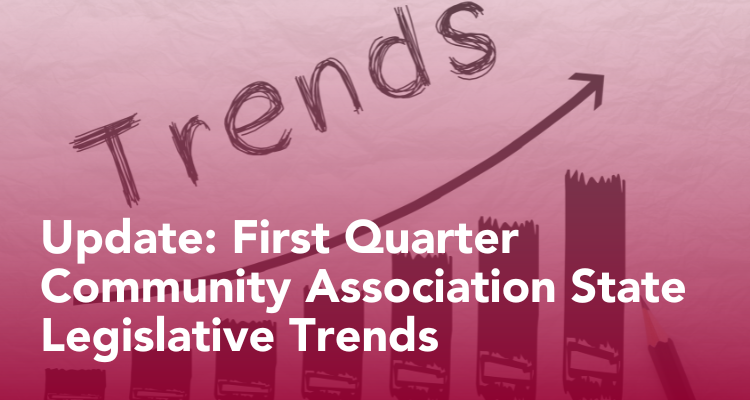Now that the first quarter of the year is behind us, 10 states have officially adjourned for 2024. With 46 state legislatures convening in 2024, CAI’s legislative action committees (LACs) have been advocating on the state level to develop and maintain sound and effective public policies for the community association housing model.
CAI’s Government and Public Affairs team is tracking more than 1,100 state bills impacting community associations across the United States. More than 7,180 emails have been sent to almost 500 state legislators and staff by CAI advocates promoting reasonable public policy on behalf of the community association industry.
Last fall, CAI’s LAC members predicted legislative and policy trends in 2024 based on conversations with elected officials, industry stakeholders, and peers, and many of these are proving to be accurate. Here is a round-up of legislative hot topics and issues impacting community associations being addressed to date:
Reserve Studies and Funding: Legislation that mandate reserve studies and appropriate funding for condominium and homeowners associations is a policy issue expected to be discussed in numerous states in 2024. CAI supports mandated reserve studies and funding for new community developments and periodic reserve studies for communities with major shared components.
These seven states introduced legislation to address new or update current reserve study and funding regulations in community associations: Connecticut, Georgia, Hawaii, Illinois, Maryland, Michigan, and Virginia.
Access to Affordable Insurance: Access to affordable property insurance coverage, especially for condominiums and housing cooperatives, has become increasingly challenging. Community associations have seen extraordinary premium increases that are unaffordable. Extreme examples of the insurance crisis can prompt community associations to use a line of credit or special assessment to pay these extraordinary premiums.
These five states have introduced legislation addressing insurance regulations that would impact community associations: California, Florida, Hawaii, Maryland, and South Carolina.
Environmental Sustainability: To address issues related to climate change and preserve the environment for the future, community associations are navigating rules related to the installation and placement of solar devices and electric vehicle charging stations as well as incentives for energy-saving initiatives like window replacement, lighting choices, and more.
More than 20 states including California, Colorado, Connecticut, Delaware, Georgia, Hawaii, Illinois, Indiana, Kansas, Maryland, Massachusetts, Michigan, Missouri, Nebraska, New Jersey, Pennsylvania, Virginia, Vermont, and Washington are addressing regulations related to electric vehicle charging stations and solar panels this year.
Board Member Education/Training: Community association board members are faced with increasing responsibility to navigate compliance with local, state, and federal laws and greater complexities within communities; especially with the aging infrastructure and with a greater number of people living in community associations. As these volunteer roles become more complex, legislators are looking for solutions to ensure volunteers have the proper training and education to fulfill their responsibilities. As such, more states are considering mandatory education requirements for board members. CAI currently opposes mandatory board member education; it supports board member education as a best practice. A CAI public policy task force is currently recommending that this policy be adjusted to support some level of state-mandated board member education. This update is under consideration and a final policy will be published later in 2024.
These three states have introduced legislation regulating state-mandated board member education in community associations: Maryland, New Jersey, and Washington. Washington introduced legislation that would mandate fair housing training for officers or board members in community associations, which failed to pass in 2024.
Fining Authority and Foreclosures: Homeowners value community rules and regulations that lead to safer, more attractive, and more valuable homes. Rules are enforced with fines that could lead to foreclosure. It is most important that CAI preserves the association’s authority to collect unpaid assessments when seriously delinquent, and as a last effort through a lien and foreclosure process.
These seven states introduced legislation limiting a community association’s foreclosure ability: Arizona, Colorado, Georgia, Minnesota, North Carolina, South Carolina, and Virginia. State LACs are working or have worked directly with legislators and staff to educate them on the established reasonable procedure behind lien foreclosure in community associations. Virginia’s bill became law and establishes a minimum threshold for pursing foreclosure to enforce judgment or assessment liens of $5,000 exclusive of attorney fees. It also requires associations to maintain individual assessment account records, and document recorded liens as long as effective. It also extends assessment lien enforceability from three to 10 years.
Dispute Resolution in Community Associations: Alternative Dispute Resolution (ADR) is statutorily required in many states. Even where ADR is not required by law, CAI urges communities to adopt policy resolutions to offer ADR for housing-related disputes between individual unit owners as well as between owners and the association.
These 10 states have introduced legislation to either create an ombudsman office or initiate dispute resolution practices by community associations: Florida, Georgia, Hawaii, Illinois, Maryland, Massachusetts, Minnesota, New Hampshire, New Jersey, and New York.
Read more on these issues on our advocacy priorities webpage and stay connected with our advocacy blog for updates on our progress with these and other important legislative issues.
Learn more about CAI’s legislative action committees and legislation being tracked in your state here.
If you have questions or comments, please contact CAI’s Government and Public Affairs team at government@caionline.org, and learn more about CAI’s advocacy priorities.



